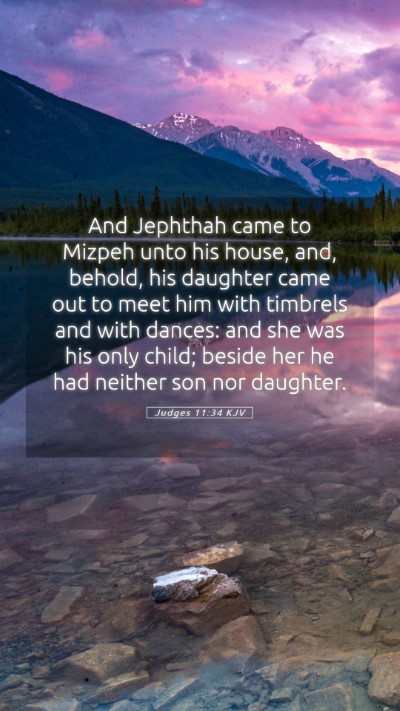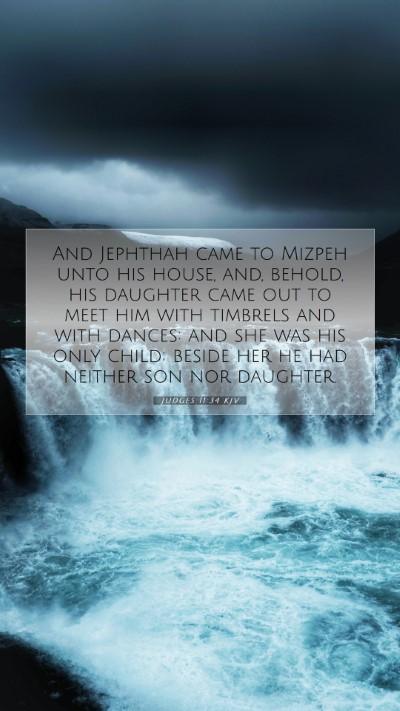Judges 11:34 - Bible Verse Explanation and Commentary
Bible Verse: Judges 11:34
Verse: "And Jephthah came to Mizpeh unto his house, and, behold, his daughter came out to meet him with timbrels and with dances: and she was his only child; beside her he had neither son nor daughter."
Understanding Judges 11:34
This verse marks a pivotal moment in the narrative of Jephthah, bringing to light themes of sacrifice, regret, and the gravity of vows made before God. The emotional weight of the situation is amplified as Jephthah returns victorious from battle only to be greeted by his beloved daughter, signifying both joy and impending tragedy.
Key Insights from Commentaries
-
Matthew Henry's Commentary:
Henry emphasizes that Jephthah's victory over the Ammonites is overshadowed by the consequences of his rash vow. His daughter’s joyful welcome contrasts sharply with the grief that will soon follow, underscoring the tragic irony of the human condition and the weight of promises made to God.
-
Albert Barnes' Notes:
Barnes points out that the cultural context highlights the importance of family and lineage in Israelite society. The text reveals the profound sorrow of losing one’s only child, especially in a society that places immense value on progeny. This verse serves as a reminder of the irreversible nature of certain life choices.
-
Adam Clarke's Commentary:
Clarke provides a poignant reflection on the significance of vows and the responsibilities that accompany them. He interprets Jephthah's situation as an example of how one's intentions can lead to unforeseen consequences, urging readers to consider their commitments in light of potential outcomes.
Historical Context
To truly grasp the meaning of Judges 11:34, one must consider the historical context of the period when judges ruled Israel. Jephthah was a military leader appointed during a time of conflict, and his vow to sacrifice whatever first emerged from his house is deeply entwined with ancient Israelite customs and beliefs about divine favor and retribution.
Application of the Verse
The implications of this verse extend into contemporary life, as it invites readers to reflect on the nature of their vows and promises. It serves as a cautionary tale about ensuring that commitments align with one’s values and responsibilities, emphasizing the need for thoughtful consideration before making declarations that might bring unintended harm.
Bible Study Insights
For those engaging in Bible study groups or seeking online Bible study tools, Judges 11:34 presents rich themes to explore. Discussions can focus on the human tendency to make impulsive vows and the burdens they may carry. It can be used as a springboard for broader topics such as the nature of faith, sacrifice, and familial relationships.
Cross References
- Genesis 22:1-8: The story of Abraham and the binding of Isaac.
- Leviticus 27:1-8: Laws concerning vows and dedicating individuals or property to the Lord.
- 1 Samuel 1:11: Hannah's vow regarding her son Samuel.
Conclusion
In summary, Judges 11:34 serves as a powerful reminder of the complexities surrounding vows and their fulfillment. Through the lens of different commentaries, one can derive a deeper understanding of the emotional and moral implications of Jephthah's story. This verse invites readers to engage in Bible verse interpretations, Scripture analysis, and Biblical exegesis to draw personal lessons applicable to their lives.


